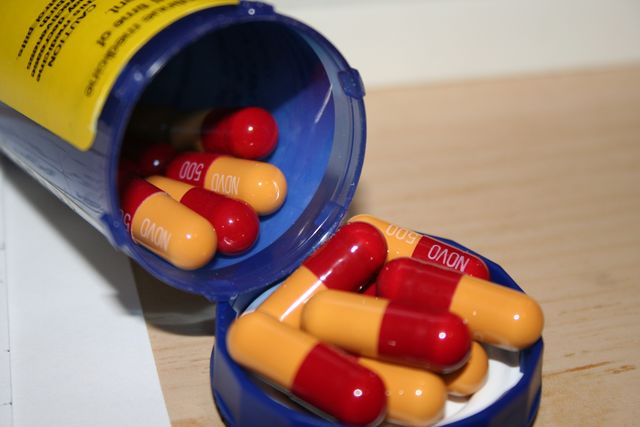This topic takes on average 55 minutes to read.
There are a number of interactive features in this resource:
 Biology
Biology
 Chemistry
Chemistry
 PSHE / Citizenship studies
PSHE / Citizenship studies
 Science
Science
The use of antimicrobials acts as a selection pressure. Only resistant microbes can survive exposure to antimicrobials. These resistant microbes can go on to replicate and pass their resistance on to their offspring. Resistant microorganisms consequently become more common in the population. This process occurs whenever antimicrobials are used.
The misuse of antimicrobials speeds up the spread of resistance. There are many different types of misuse. Some examples are described below.
Patients can inappropriately take antimicrobials in various ways. Examples include:
The exposure of microbes to a low concentration of medicine (as achieved when skipping doses or not taking doses at regular time intervals) increases the spread of resistance, as there is a lower chance that microbes will be killed.
Infections often clear without the help of antimicrobials. It is predicted that 30% of all antibiotics prescribed out of hospitals are unnecessary.
In addition, inappropriate antimicrobials are often prescribed. One potential reason for this is that there are very few diagnostic tools capable of rapidly identifying infections. Consequently, infections can be wrongly diagnosed and inappropriate antimicrobials used as treatment.
Narrow spectrum antimicrobials are medicines that target either a single species or a few species. A lack of diagnostics also stops doctors using narrow spectrum antimicrobials as often as they could.

A review published in the British Medical Journal in 2017 suggested that courses of antibiotics are too long. The authors claimed that antibiotic treatments are prescribed based on a fear of under treating a patient. The authors claimed that over use is more concerning than under treatment.
The ideas presented in this review were picked up on by the media, who claimed that this review concluded that patients did not need to finish a course of antibiotics. This is a simplification of a complicated issue.
Read the articles below:
Rule that patients must finish antibiotics course is wrong, study says, The Guardian
'Don't finish the course of antibiotics'- experts turn medical advice on its head, The Telegraph
What do you think?

In some countries around the world, antimicrobials can be bought from a pharmacy or online without a prescription. This uncontrolled access to antimicrobials is irresponsible as there is a risk that these medicines will be used unnecessarily and inappropriately. Specific antimicrobials are prescribed for specific infections- not all antimicrobials can treat all infections.
In many countries healthcare is extremely expensive and hard to access. Unrestricted sale of antimicrobials enables individuals in these countries access to these medicines.
This poses an ethical dilemma whether to restrict antimicrobials in these countries- as even though restriction could reduce the spread of resistance it could also prevent access to these lifesaving medicines for many individuals.
What do you think?
Should access to antimicrobials be restricted?

In the UK in 2013, 44% of the total antibiotic use was in animals. Antibiotics are used in animals for three reasons: to treat infections, as prophylaxis and to promote growth.
The use of antibiotics for growth promotion is controversial. The hypothesis is that antibiotics kill the normal microbes in the intestine, which is thought to increase the amount of nutrients available for the animal and enhance growth. This practice however drives resistance development in animals. Humans then consume these animals as meat, which causes the spread of resistance to continue. The use of antibiotics for growth promotion is illegal in many countries.
 |
 |
 |
Antibiotics are used for various reasons in farm animals such as sheep, cows and chickens.
There have been reports of antimicrobials leaking into the environment surrounding factories. This can happen as a result of substandard manufacturing conditions.
Pollution from factories can expose microorganisms in the local environment to antimicrobials. This promotes the growth of resistant microbes. Even though the pollution is local - due to travel, this resistance can quickly spread globally.